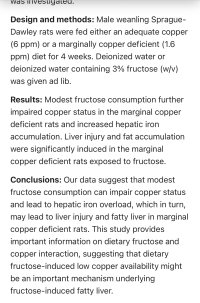Douglas Ek
Member
- Joined
- Feb 8, 2017
- Messages
- 642
A role for low hepatic copper concentrations in nonalcoholic Fatty liver disease. - PubMed - NCBI
”Copper has a role in antioxidant defense, lipid peroxidation, and mitochondrial function, and copper deficiency has been linked to atherogenic dyslipidemia. We aimed to investigate the potential role of copper availability in the pathogenesis of nonalcoholic fatty liver disease (NAFLD).”
”Hepatic copper concentrations in patients with NAFLD were lower than in control subjects (17.9+/-8.4 vs. 31.4+/-8.2 microg/g; P<0.001) and in patients with other liver diseases (P<0.05 for all liver diseases). In patients with NAFLD, lower liver copper was correlated with more pronounced hepatic steatosis (R=-0.248; P=0.010), fasting glucose (R=-0.245; P=0.008), and components of the metabolic syndrome (MetS; R=0.363; P<0.001). Patients with nonalcoholic steatohepatitis (NASH; n=31) had lower hepatic copper concentrations than those with simple steatosis (n=93; P=0.038). Restriction of dietary copper in rats induced hepatic steatosis and insulin resistance (IR).”
Copper deficiency may be a leading cause of ischaemic heart disease
”Copper is an essential trace element that has been an overlooked factor in IHD. Numerous animal and human studies have demonstrated that copper deficiency can cause IHD and that copper supplementation or adequate dietary copper can improve many of the risk factors for IHD. Copper deficiency could be driving much of the current burden of IHD in the population. Copper intakes have been declining and it appears that a large fraction of the population does not even consume the recommended daily allowance (RDA) for copper3 (0.9 mg per day) let alone an optimal intake of copper (2.6 mg per day).4Thus, it appears that much of the population is at risk of inadequate but especially suboptimal intakes of copper.”
”The oxidation of low-density lipoproteins (LDLs) is thought to play a significant role in atherosclerosis.10 Copper deficiency increases the susceptibility of both LDL and other lipoproteins (high-density lipoprotein (HDL) and very-low-density lioprotein (VLDL)) to oxidation.11 Lipoproteins from copper-deficient animals show increased formation of thiobarbituric acid reactive substances when exposed to oxidative reactions using iron, which indicates that copper may exert a protective effect against iron-induced oxidation.”
”Patients with hypercholesterolemia and supplemented with copper at 5 mg/day for 45 days had a decrease in total cholesterol, LDL and triglycerides, and an increase in HDL cholesterol.15 The results suggest that perhaps around 40% of patients with hypercholesterolemia may have marginal copper deficiency, and that their condition could be treated with copper supplementation.”
”In rats, a diet high in saturated fat increases cholesterol levels, with unsaturated fat having a protective effect. However, in copper-deficient animals, the level of dietary iron determines hyperlipidemia, not the type of dietary fat.17 The group of copper-deficient animals that were fed high-iron diets either died of ruptured hearts or developed severe anaemia, enlarged hearts and livers, hypercholesterolemia and elevated triglycerides. Thus, copper deficiency ties in with the iron hypothesis of heart disease, in which excess levels of stored body iron promote IHD.”
”More importantly, copper deficiency can lead to hepatic iron overload and cirrhosis19 20 with iron overload being treated by copper supplementation.21 Iron overload also induces mild copper deficiency.22 The severity of copper deficiency can also be reduced with iron chelators.23 Thus, copper deficiency contributes to iron excess in the body and vice versa.”
”The ratio of zinc to copper may also be important in the production of hypercholesterolemia. In rats, high ratios of zinc to copper in drinking water resulted in higher plasma cholesterol.24 Inadequate copper intake in humans can also result in increased cholesterol levels even when intake is only slightly below the RDA (0.83 mg per day).25 In humans, copper supplementation of adult men at 2 mg/day for 4 weeks increases levels of SOD and plasma diamine oxidase and significantly increases lag times for lipoprotein oxidation in those subjects with lower levels of stored body copper.26”
”Copper deficiency in rats also results in upregulation of the proinflammatory enzyme COX-2, suggesting that copper may increase inflammation independently of SOD activity.46 Copper deficiency in animals leads to increased hepatic expression of genes involved in inflammation and fibrinogenesis47 and also increases nuclear factor kappa beta-1.48 Copper supplementation in rats fed a copper-deficient, high-sucrose diet restores beta-cell function and reduces pancreatic low-grade inflammation (reverses hyperglycemia and reduces the infiltration of fat and IL-1β-expressing macrophages).49 Thus, copper has multiple actions for controlling inflammation including the rise in cereuloplasmin.50 51”
Copper is key in burning fat: Scientist says results could provide new target for obesity research
Copper seems to be important for everything improving insulin sensitivity, reducing high cholesterol, lowering COX which would lower estrogen and serotonin, reducing lipid peroxidation further reducin cox and estrogen, protecting against iron damage in liver and as I previously posted a study dopaminergic neurons in parkinsons. It also seems to play a role in weight loss and fat burning. From what I understand our soils are heavily depleted in copper and that glyphosate is also a copper chelator. As the study mentions I believe opti al copper levels are higher closer to the 1-2 mg per day. And I bet that a lot people barely get 0,5 mg per day. Also people supplement zinc wildly thus reducing copper even further. And take excess vitamin D reducing the livers capability to make ceruloplasmin out of copper.
Last edited:

